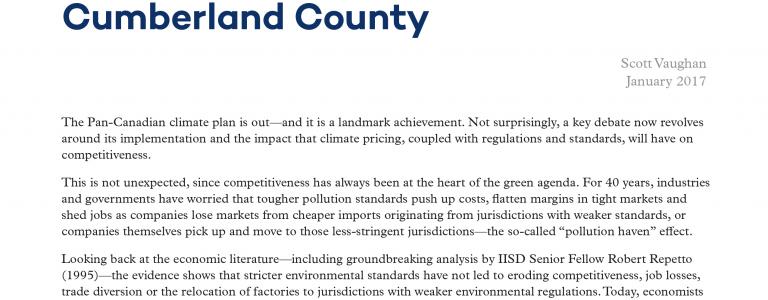Jobs and the Low-Carbon Energy Transition: Perspectives from Cumberland County
This commentary begins in Cumberland County, in Northwestern Nova Scotia, Canada, where new jobs are emerging in the renewable energy sector. It argues that the shifts underway in Cumberland County are representative of a larger transition, as job losses in the fossil fuel industry are replaced by growth in renewable energy.
Debate over Canada’s climate change policies has frequently centered on concerns over jobs and economic competitiveness.
This is not surprising. Industries and governments have long worried that tougher pollution standards push up costs, flatten margins in tight markets and shed jobs. However, the debate today takes place in an environment of high anxiety over wages and job losses, and alarm over growing levels of inequality.
Against that backdrop, this commentary begins in Cumberland County, in Northwestern Nova Scotia, Canada, where new jobs are emerging in the renewable energy sector. It argues that the shifts underway in Cumberland County are representative of a larger, global transition, as job losses in the fossil fuel industry are replaced by growth in renewable energy.
You might also be interested in
Powering the Clean Energy Transition: Net-Zero electricity in Canada
This brief explains how a shift to clean power generation can offer affordable, reliable electricity, benefiting households and businesses alike.
IISD Welcomes Draft Regulations for Oil and Gas Pollution Cap
A firm cap on emissions can provide certainty for industry to invest in decarbonization, while ensuring the sector is on a path to net-zero by 2050.
For Nature-Based Solutions to Be Effective, We Need to Work with Indigenous Peoples and Local Communities
Nature-based solutions have been praised as a promising approach to tackling the twin crises of climate change and biodiversity loss. But some Indigenous Peoples and local communities are questioning the legitimacy of the concept and what it symbolizes. It is time to listen to what they have to say.
How Fossil Fuels Drive Inflation and Make Life Less Affordable for Canadians
New report takes closer look at how Canada’s dependence on fossil fuels impacts energy costs and prices of essentials such as transportation, home heating, and housing.
